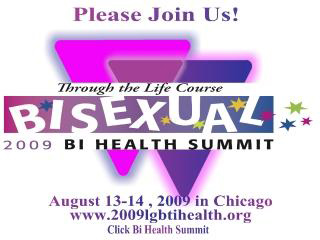By Jennifer Bonardi
As a co-chair of the Bi Health Summit, I was both recharged and relieved in attending this incredible event that was 18 months in the making. To assemble in the beautiful city of Chicago and put words to power regarding our health needs was a rare and edifying experience. For those who didn’t have the pleasure of joining us at this one-day summit in the summer, here are what I consider the three highlights…and they aren’t what you might expect.
Proving Our Worth
You couldn’t deny that the Bi Health Summit was interesting, empowering, and chock full of facts and opinions regarding all aspects of bisexuality and health. But still, some asked: what was the point? Why did we need this conference? Specifically, why should we focus on bi health? Why can’t we lump it in with either straight health or gay health depending on the actions of the people at hand?

(Chicago), Ed Negron (Chicago),
Jen Bonard
From the summit came the answer: researchers presented findings that showed bisexuals having worse outcomes than straights and gays/lesbians in areas of smoking/alcohol/drug use, depression and suicide ideation, and violence victimization. Some presenters indicated that they were actively discouraged from conducting research on bisexuals; ironically, the work they were able to do indicated that even more research specific to bisexuals is needed. The summit successfully conveyed the idea that, however counter intuitive it may seem initially, focusing on sexual identity instead of activity when analyzing health issues yields critical data.
Minorities of a Minority Within a Minority
In my senior year at Tufts, I remember walking into the first TLGBC meeting of the semester, surveying the room full of new faces, and looking at the two other coordinators with glee. They returned my look with the same silent message: “Hallelujah – we finally have some queer people who aren’t white!” That familiar feeling washed over me again as I took my place at the Bi Health Summit.

Julie Ebin, Cheryl Dobinson (Toronto), Stewart Landers (Boston)
It was a pleasure to see a great representation of people of color both attending and presenting at the Bi Health Summit. Their points of view undoubtedly enriched the exchange of information that day, reminding us that one’s experience as a bisexual can differ according to culture. I find that when minorities within a community don’t come to the table, it’s often because they haven’t been invited. The fact that we saw such diversity among our ranks that day makes me optimistic that much more of our community feels welcome to be there.
Sticking with Our Allies
One of our co-chairs had the great idea of providing stickers at registration that said “Bi” or “Bi Ally” and featured the bi flag. Attendees not only stuck them on their plastic name tags during the Bi Health Summit but also proudly wore them throughout the rest of the LGBTI Health Summit. The stickers were a big hit, and the visual representation of bi people at the larger summit made a real statement.
One of our co-chairs had the great idea of providing stickers at registration that said “Bi” or “Bi Ally” and featured the bi flag. Attendees not only stuck them on their plastic name tags during the Bi Health Summit but also proudly wore them throughout the rest of the LGBTI Health Summit. The stickers were a big hit, and the visual representation of bi people at the larger summit made a real statement.
The above highlights of the Bi Health Summit may be interesting but reading them pales in comparison to actually participating in the event. If you couldn’t make it to this year’s summit, I urge you to attend the next one which will likely be in 2011.
Jen Bonardi is a Board Member of the Bisexual Resource Center.

